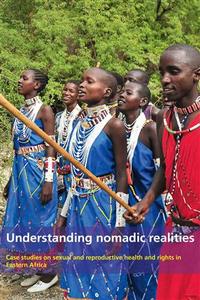Understanding nomadic realities: case studies on sexual and reproductive health and rights in Eastern Africa
van der Kwaak, Anke, Baltissen, Gerard, Plummer, David, Ferris, Kristina, and Nduba, John (2012) Understanding nomadic realities: case studies on sexual and reproductive health and rights in Eastern Africa. KIT Publishers, Amsterdam, Netherlands.
![[img]](https://researchonline.jcu.edu.au/25542/1.hassmallThumbnailVersion/25542_Plummer_2012.jpg)
|
Image (JPEG) (Book Cover)
- Cover Image
Download (42kB) |
|
|
PDF (Front Pages)
- Supplemental Material
Download (305kB) |
||
|
PDF (Back Pages)
- Published Version
Download (104kB) |
Abstract
In Understanding Nomadic Realities: Cases studies on Sexual and Reproductive Health in Eastern Africa health professionals and planners present studies from what is known as so called “hard to reach areas” as Afar Ethiopia, Maasai in Kenya and Tanzania, and other pastoralist groups in Tanzania. In this book two sides of the medal are shown. On the one hand the cultural and local beliefs in the context of sexual and reproductive health, on the other hand the day to day challenges of making reproductive health services accountable and responsive to especially young pastoralist girls and women. All authors were active with the Nomadic Youth Project of the African Medical and Research Foundation (AMREF) in Africa.
This book consists of three parts. In the first part Beliefs and Values, the authors show how cultural values, gender relations and religious beliefs influence maternal health, uptake of family planning, prevalence of female genital cutting and practices around childbirth.
In the second part, Pathways to Childbirth, the different actors and factors that impact on pregnancy and delivery are presented for Afar and Maasai. Also there is a call for improved community based health information in Tanzania.
In the third part, Power to Decide, case studies of power relations and decision-making processes among the different nomadic groups are presented. Men, mothers in law and religious leaders are amongst the most important authorities in the realm of reproductive health sometimes without any knowledge and regardless of the desires and needs of the women and girls.
This book does not give hands on solutions for achieving the Millennium Development Goals 3, 4 and 5 to improve gender relations, child and maternal morbidity and mortality. It does however give a good glance into the everyday life of pastoralist communities in a globalized world. It presents a view from the people themselves and therefore not to be missed as reading material for anyone interested or working in Eastern Africa.
| Item ID: | 25542 |
|---|---|
| Item Type: | Book (Edited) |
| ISBN: | 978-94-6022-2016 |
| Date Deposited: | 21 Mar 2013 01:51 |
| FoR Codes: | 11 MEDICAL AND HEALTH SCIENCES > 1117 Public Health and Health Services > 111799 Public Health and Health Services not elsewhere classified @ 100% |
| SEO Codes: | 92 HEALTH > 9205 Specific Population Health (excl. Indigenous Health) > 920503 Health Related to Specific Ethnic Groups @ 100% |
| Downloads: |
Total: 1858 Last 12 Months: 9 |
| More Statistics |



